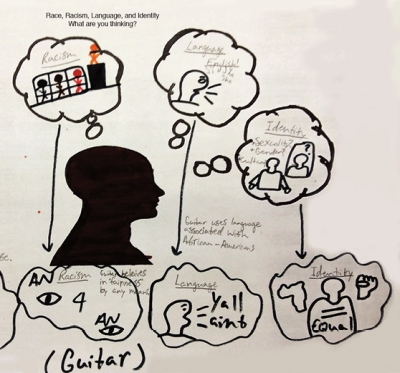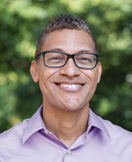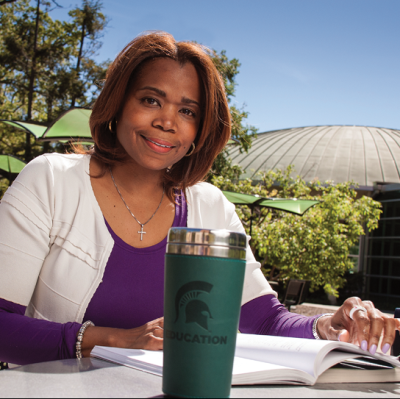African American Language, Power, and Identity: Bringing Tough Discussions into the Classroom
- Davena Jackson
- Doctoral Student
- Curriculum, Instruction, and Teacher Education Program
- College of Education

Student artwork from the high school classroom Davena Jackson works with in Detroit.
Davena Jackson is a student in the College of Education's Curricular Instruction and Teacher Education doctoral program. Three years ago she was a veteran high-school English teacher in Southeast Michigan. For 15 years, she taught a variety of English courses that included Advanced Placement English, Honors American Literature, and other courses. She loved teaching, loved the kids, and was basically satisfied with her life.
Then, about seven years ago, she went to a conference of the Michigan Council of Teachers of English and met April Baker-Bell, who was an MSU graduate student at the time and is now an assistant professor in MSU's Department of Writing, Rhetoric, and American Cultures. The two began talking about research, theory, and practice. Jackson was so impressed that she invited Baker-Bell to work with her and her students. They collaborated on a unit centering on African American language (AAL), power, and identity. "April strengthened my unit on language," said Jackson. "Prior to her coming to work with me, I did not include a section on AAL, which some of my students used in their discourse. The collaboration allowed opportunities for my students to interrogate dominant notions about the intersections between AAL, power, and identity."
Baker-Bell agreed. "This experience working with Davena illustrates how the collaboration between educators and researchers and the dissemination of pedagogically grounded language arts curriculum can be valuable in our efforts to align theory, research, and practice," she said.
Documenting How Effective Teachers Work
The MSU connection led Jackson to a meeting and collaboration with Django Paris, associate professor in the Department of Teacher Education, who is now Jackson's advisor. Paris documented ways in which Jackson's new pedagogy supported her students academically and intellectually while being culturally responsive. "Davena's work on sustaining her Black students' linguistic and cultural identities through the study of literature, literacy, and research helped me understand the possibilities of culturally sustaining pedagogy in new ways," he said. "As a researcher and teacher educator, Davena offers the field needed frameworks and practices for transforming English classrooms into sites of racial justice for students of color and their teachers."

I have collaborated with Davena across four semesters of undergraduate teaching and in the preparation of a proposal presented at the National Council of Teachers of English 2016 Annual Convention in Atlanta. Davena and two graduate teaching assistants coauthored and presented "Planning for Criticality: Reimagining the Curriculum of a Secondary English Teacher Education Program" for a panel on promoting and sustaining critical and culturally responsive pedagogy with preservice teachers in urban settings. Davena and her colleagues reported on the experiences and outcomes of revising the Teacher Education course syllabi (TE 407-408) on teaching secondary English to diverse learners and redesigning readings, discussions, and assignments. They also reported on creating and implementing lessons and units across a syllabus that envisions and enacts student learning and learning environments fostering equity, agency, and meaningful literacy experiences. Davena assisted the teaching and research team in conceptualizing how preservice teacher educators, entering their year-long teaching internship, may increasingly construct and navigate important curricular space toward examining understandings of equity through discussion of African American language.
Vaughn W. M. Watson
The students' response was overwhelmingly positive. "We did this for a whole semester," said Jackson. "The culminating activity included the students touring MSU's campus. By the end of the semester I was fired up to go back to graduate school. I was looking to impact the schooling of youth in a different way. Pursuing a doctorate would allow me to work with and learn from professors, graduate students, and preservice teachers."
"I didn't leave K-12 because of any dissatisfaction," she said. "I just started wanting to have a more direct impact by working with preservice teachers."
Learning to Address Critical Discussions
In teaching her undergraduate English Education methods courses at MSU, Jackson and Vaughn Watson, assistant professor in Teacher Education, assist students in creating lessons that will address many of the critical discussions that were taught in a seminar about literacy learning for their unit plans. One lesson in particular that Jackson teaches centers on the intersection of race, racism, and language, which also incorporates other concepts—such as identity and values, civic and literacy learning—into a wider theme of cultural justice.
Working With a Teacher-Partner
Now in her third year of graduate school, Jackson has been working with a high-school teacher in Southeast Michigan for the past year. "I did a survey around teachers' practices," she said. "Then the next semester I did a pilot study to observe if the teacher engaged in asset-based pedagogical practices. This teacher was so effective that I decided to do a case study to learn from her and her students." She worked with the teacher over a semester to document her practices and the kinds of learning opportunities she created for her students.

Jackson is specifically interested in the ways in which African American youth engage in critical discussions about controversial topics (e.g., race, racism, and language). She is learning that these discussions are invaluable experiences for the students. "They enjoyed having the opportunity to talk and make meaning about constructs (race, racism, identity, language, etc.) that affect their lives," she said. "I have evidence from student interviews: They like having an opportunity to talk about these issues. They said it helps them think about navigating school and society more broadly."
One student commented during a survey interview, "I feel like when you have discussions like that, it's not just for you to get your views out. It's for other people to hear it as well, and then they find, like, new things that they never thought about or new views."
"Look at the dynamics," said Jackson. "They were really excited about this. I juxtapose this with the undergrads I'm teaching. Some have said that they just didn't talk about critical topics that disrupt the status quo in high school."
Enriching the Classroom Experience
Jackson plans to incorporate what she's learned from her practicum into thinking about what she might do for her dissertation.
Her teacher-partner (who is not named here due to project confidentiality requirements) recognizes the importance of letting students know there is value in their culture and meaning-making, and talking about these topics. Jackson reported that "she said to me, ‘It's important for students to talk about critical topics. I am driven by what's happening in the real world, and I make connections to classroom learning.'"
Jackson agreed. "When teachers foster an environment that affirms students' cultural identities, languages, and experiences, while at the same time providing opportunities so that students may interrogate and critique the dominant cultural norms, they have a much richer classroom experience," she said.
- Written by Linda Chapel Jackson, University Outreach and Engagement